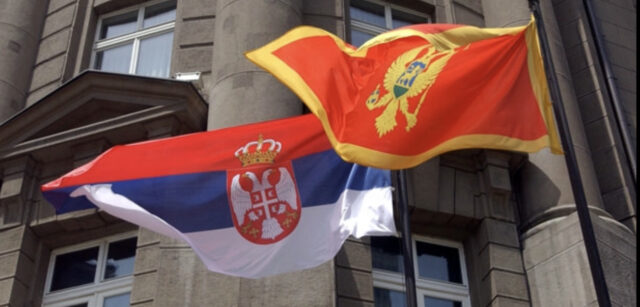The Balkan motto might well be “another year, another crisis.” While the political impasse in Bosnia-Herzegovina and the recognition dispute between Serbia and Kosova both need urgent resolution, the stability and independence of Montenegro is also under increasing threat, with Belgrade and Moscow aiming to weaken the country’s independence.
The broad coalition government in Podgorica elected in August 2020 was widely viewed as a fresh start after three decades of rule by the Democratic Party of Socialists (DPS). Western capitals hoped that the new administration could root out corruption and enable Montenegro to make faster progress toward EU membership. But instead of a “clean hands” approach, the coalition government has demonstrated its vulnerability to the underhand Belgrade-Moscow agenda.
The dominant coalition, For the Future of Montenegro, appointed the new Prime Minister Zdravko Krivokapić; the second-placed coalition, Peace is Our Nation, installed Aleksa Bečić as speaker of parliament; and the junior coalition partner, the United Reform Action (URA) appointed Deputy Prime Minister Dritan Abazović. Even though most of the cabinet has no formal party affiliation the influence of pro-Belgrade activists remains pronounced.
At the core of the threat to Montenegro is Belgrade’s non-acceptance of the country’s distinct national identity and separate statehood. In his Greater Serbia ambitions President Aleksander Vučić is scheming for a Serbia-Montenegro Union, presumably modeled on Putin’s drive for a Russia-Belarus Union, with Montenegro as the junior partner. In such an arrangement, Belgrade would determine Montenegro’s foreign and security policy, weaken Montenegrin identity, and sideline the Albanian and Bosniak minorities.
The strongest political force in the leading coalition, the Democratic Front, is committed to reversing Montenegro’s independence. But rather than pursuing a fast-track approach that could fracture the government, it envisages a step-by-step process of forging tighter links with Serbia and using the tripartite coalition as a camouflage to maintain a parliamentary majority. Conversely, the two junior governing coalitions evidently calculated that they needed the Democratic Front to gain power and pursue their reformist platform. However, one often discovers in the Balkans that it is easier and more profitable to promote nationalism than to conduct reforms.
The Russian connection with the new government is also becoming clearer. Montenegro’s appeals court revoked the sentences of the October 2016 conspirators who sought to overthrow the previous government under the direction of Russian intelligence services. Moscow clearly applied pressure to reverse the decision and is enhancing its role in Podgorica.
Negative trends are also evident in Montenegro’s security sector regarding several problematic appointees. Milan Knežević, leader of the Democratic Front involved in the 2016 coup plot, was emplaced as chairman of parliament’s Security and Defense Committee. With other appointments in the security sector evidently coordinated with Belgrade and Moscow, NATO may need to freeze the sharing of sensitive information with Podgorica to avoid being compromised. Serbia and Russia are also targeting Montenegro’s strategic assets, including plans to purchase the port of Bar and the country’s electric company.
The more radical pro-Serbian forces cannot monopolize power but one should not discount a provocation designed to enhances their position. The local elections in Nikšić in mid-March may provide an opportunity to escalate conflicts in the country given that activists from Serbia and Bosnia’s Republika Srpska have targeted the town to enhance the pan-Serbian vote.
However, despite some early successes, including Montenegro’s general elections, Belgrade’s unification project faces several obstacles. The tripartite government coalition remains brittle and hangs by the slimmest parliamentary majority. The URA may conclude that its clean government idealism cannot be implemented with Serbian nationalists embroiled in corrupt foreign deals with Russian oligarchs and state-directed companies. The government could face charges of corruption and mismanagement that would undermine its initial public support.
The resistance and backlash of the Montenegrin majority will also become more visible during attempts to undermine their identity. The law on religious property, designed to strengthen the role of the autocephalous Montenegrin Orthodox Church, has been overturned. The Serbian Orthodox Church seeks to tighten its clerico-imperial jurisdiction over Montenegro, cognizant that the Ukrainian Orthodox Church officially gained ecclesial independence from the Russian Orthodox Church in 2019 and is reclaiming much of the property appropriated by the Moscow patriarchate. Further anti-Montenegrin maneuvers may include the introduction of dual citizenship, so that non-resident Serbs can register in the census and vote in elections, and the pursuit of cultural and educational campaigns to turn Montenegrins into Serbs.
The DPS lost power largely because of public anger with corruption and cronyism, but it still remains the largest party and has a chance of rallying Montenegrins around a program of national self-defense from assault by Belgrade and Moscow. But it will need a broader political coalition, calculating that Serbia’s assault may actually strengthen Montenegrin identity. Support for statehood and NATO membership is reportedly rising in the country, with some polls indicating that 67% of citizens now back independence and 55% support NATO membership, with only 7% wanting a common state with Serbia and 20% a loose union.
The role of the Quint embassies (U.S., Germany, France, UK, Germany) will be important in the coming months to discourage any government decisions that generate open conflict. Above all, the Biden administration must become more active to undercut Vučić’s Greater Serbia goals through a three-pronged approach. First, the Serbia-Kosova dialogue has to be given teeth in line with Biden’s recent letter to Vučić calling for mutual state recognition. Second, a multi-national initiative must be launched to implement necessary constitutional changes in Bosnia-Herzegovina and develop a fully functioning state. And third, Vučić must be warned that political interference in Montenegro’s politics will rebound negatively against a government with destabilizing foreign connections. The tentacles of Kremlin influence in Belgrade and Podgorica need to be unearthed and amputated.
Janusz Bugajski is a Senior Fellow at the Jamestown Foundation in Washington DC. His recent book, Eurasian Disunion: Russia’s Vulnerable Flanks, is co-authored with Margarita Assenova. His upcoming book is entitled Failed State: Planning for Russia’s Rupture.































